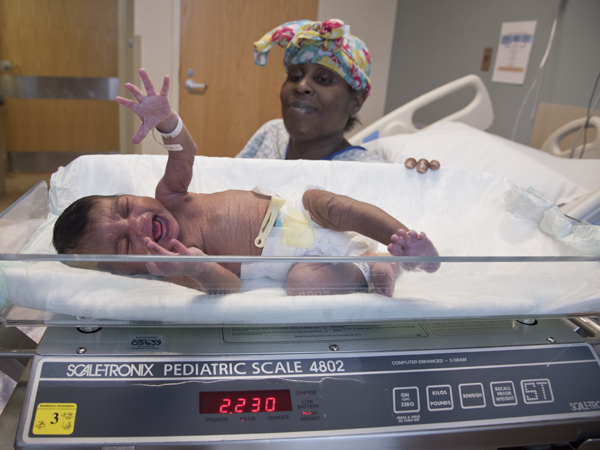State’s reduction in preterm births garners national March of Dimes award

Published in News Stories on November 05, 2015
The problem of having babies born too soon is enormous in Mississippi, but it's getting smaller all the time.
From 2009 to 2014, Mississippi reduced births earlier than 37 weeks by 11 percent overall and by 16 percent in the African-American community. The state also saw an 18 percent increase in the number of babies born at full term, over 39 weeks.
For these efforts, Mississippi received the March of Dimes Virginia Apgar Award, which recognizes states that lowered preterm birth rates by at least 8 percent from 2009 to 2014.

Owens
“We've made significant strides,” said Dr. Michelle Owens, associate professor of obstetrics and gynecology at the University of Mississippi Medical Center. “We're creating a generation of babies with a much brighter future.”
Said Dr. Charlene Collier, director of the Mississippi Perinatal Quality Collaborative: “This significant decrease means fewer babies in the neonatal intensive care unit (NICU), fewer infant deaths and fewer babies with long-term medical problems.”
Helping babies have a stronger start in life has been the focus of the Collaborative, which put representatives of UMMC, the state Department of Health, the March of Dimes and others at the same table solving the same problem.

Savich
The Collaborative is designed to look at the state as a whole. “We might do fine here in Jackson, but if we don't pay attention to the Delta and other areas, we're never going to do better in Mississippi,” said Dr. Renate Savich, professor of pediatrics and chief of the Division of Newborn Medicine at UMMC. “It really is thinking about medical care outside your own institution - how can we make the state better?”
“We all got together and realized the impact we could make,” Owens said. “It doesn't matter what pew you sit on, we are all in the same church and hearing the same message” when it comes to reductions of preterm births.
According to the U.S. Centers for Disease Control and Prevention, one of every nine infants, some 450,000 babies, was born prematurely in 2012. Preterm-related causes of death accounted for 35 percent of all infant deaths in 2010, more than any other single cause, and it is the leading cause of long-term neurological disabilities in children.
Babies born too early can face a multitude of health issues including breathing problems, feeding difficulties, cerebral palsy, developmental delay, vision problems and hearing impairment. Many organ systems, including the brain, lungs and liver need the final weeks and months of pregnancy to develop fully.
“There is evidence emerging that even babies who are born at 34 to 36 weeks can have a higher risk of difficulties in school,” said Dr. Mobolaji Famuyide, UMMC associate professor in neonatology and NICU medical director. “Extreme preemies, born at 28 weeks or earlier, have an increased risk of ADHD and autism.”
In 2007, the Institute of Medicine reported the cost associated with premature birth in the U.S. was $26.2 billion each year. “It is expensive,” said Famuyide, “and the emotional costs to families are tremendous.”

Ray
Dina Ray, director of the Mississippi Chapter of the March of Dimes, said Mississippi still has a long way to go. The state is still among the nation's highest in the rate of preterm births, at about 17 percent, according to Mississippi Department of Health figures, “but we're improving dramatically,” she said. “When infant health becomes a priority, families and babies benefit.”
Some of the vital changes being made include increasing smoking cessation programs for expectant mothers and decreasing the number of elective cesarean births prior to 39 weeks, said Owens.
“We're driving home the point that, without clear medical indications, the pregnancies should be allowed to go to their due dates.”
Making appropriate prenatal care more readily available, another way mothers and babies can have healthier pregnancy outcomes, has been another goal, as has been encouraging mothers-to-be to make health improvements before their babies are conceived.
“When blood pressure and blood sugar are poorly controlled,” said Owens, “it is better for the mother to optimize these conditions before becoming pregnant. Being thoughtful about her health and planning pregnancy are among the best decisions for a mother and her family.”
Doctors are also encouraging mothers to take a break between pregnancies. “A woman's body needs to recover after pregnancy and birth,” Famuyide said. “Eighteen months is ideal, but depending on age and risk factors, a range between 12 months and two years may be appropriate.”
Healthier outcomes for babies and their families is what the award, named for Dr. Virginia Apgar, M.D., who developed the five-point Apgar score in 1952 to evaluate an infant's health at birth, is all about.
“While we celebrate this achievement,” said Owens, “we must not lose sight of how this was done. We should realize how powerful we are when we come together to address challenges in our state. It will take everyone continuing to work together to boost us to the next level.”
Photos
 | High Resolution Medium Resolution Low Resolution |


